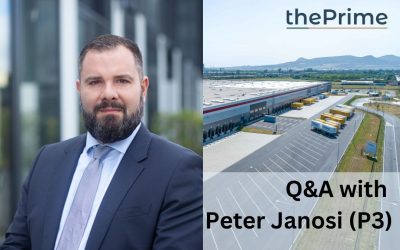ThePrime is Media partner for the October 3 conference of the Czech Council of Shopping Centers, which is entitled Driving High Performance. It takes place at the Narodní dům in Prague 2 and will feature a full day of speakers and discussions. I spoke with executive committee member director Jan Kubiček about the event, the association, and about retail.
What’s the focus of the association’s conference that you’re planning this year?
We always try to invite inspiring speakers, also from abroad, and to learn something which will help us to get through these difficult times. But as an association, we’re always trying to pick up on the most relevant topics and share them among us. The point of our annual conference is to highlight the most important of these. That’s why we named this year’s conference “Driving Performance.” Because now that the worst part of the crisis is over, we have to work out what we can do and how to operate in this environment. The COVID and energy crisis may be over, but we’re back in a normal economical cycle. That means that a recession could be on the way. So far, the retail sector has proved to be very resilient. But while we’ve survived quite well, it’s clear that the retail sector will have to change. That’s what we’ll be trying to solve this year. For landlord panels, the focus will be on how to approach marketing and what the tenant’s role will be in it.
We’ll start with economists and a very interesting presentation from an experienced professional, Tomaš Prouza. We’ll then have a panel of landlords, and a panel of retailers. Those will be followed by the highlight of the conference, the famous futurologist Mark Stevenson. He’ll give an inspirational speech about the future of our industry.
You talked about how retail has to transition to functioning in a non-crisis environment, that’s hopefully a bit more normal. How about the Association itself? Will members still see its utility? What’s the goal?
I’m really happy about the fact that there are more than 60 professionals who are very active in creating topics and our discussions. That was the goal of the association: to provide a platform for these discussions, to unite us, and to represent us when needed before the government, banks, investors, the public, or other stakeholders.
It seems as if the crisis helped this in a way. I mean, I remember talking with you a couple years before the pandemic when you were leading the Czech branch of the ISCS. You seemed a bit overwhelmed about keeping it going because there wasn’t a lot of energy from other people.
Absolutely. As a branch of the International Council of Shopping Centers, we couldn’t do everything that needed to be done. Everything had to be consulted with London, and we didn’t know exactly what our status was. During COVID, we had to establish our own association and it’s governed by people who want to be involved. That gave it a different spin, because you’re right: just before COVID, we really were thinking whether it makes any sense to continue. COVID showed us that you need this kind of platform for unprecedented times. We need to keep it alive, we need to do networking. And we need a space to be able to talk about our problems and highlight the things which are great. It’s basically community work.
Our idea was to have people who are engaged and knowledgeable. By definition, these people are busy, so they value their time decide about where to spend it. When these types of people are involved, then you know that the whole thing makes sense. I think that’s the key to a successful community: that you have engaged people, people who are capable and proven.
It’s remarkable how the issue of online retail has faded in importance. Post-pandemic, it’s just another topic at conferences that’s as normal as marketing or sustainability.
Basically, we are part of the omnichannel. Today, the world is all about convenience, about experience, about the best way to get the things you desire. And shopping centers can provide that if they just slightly adjust themselves. That’s what I believe we should be doing and what I want to learn about: where the tenants are going, what they believe the future is, what the triggers will be and how we, as landlords, can support them. Because at the end of the day, we are joint venture partners with tenants. Customers react quickly to changes, but we always react with a time lag. That’s why I believe these two elements, tenants and landlords, are ought to talk to each other and create the future together.
You called convenience and experience as the key for retail. Can malls really provide both? Personally, I associate e-commerce with convenience, while shopping malls are mostly about experience.
Well, for me, e-commerce isn’t always convenient, because to research a product and to decide what you want takes a lot of time. You still need to pick it up somewhere or arrange for delivery. That’s not terribly convenient. It’s true that you can quickly compare prices and alternatives online from your armchair at home. On the other hand, at a shopping center, if you see it and can touch it, you can buy it on the spot. You can discuss it with the shop assistant and with other people. You might realize when you see something in 3D and can touch it, it’s just not the same as it looks on a 2D computer screen. You might realize that you don’t want it. I think that as tenants start to understand this and act on it, it will lead to more efficient retail in the future.
Also in ThePrime






